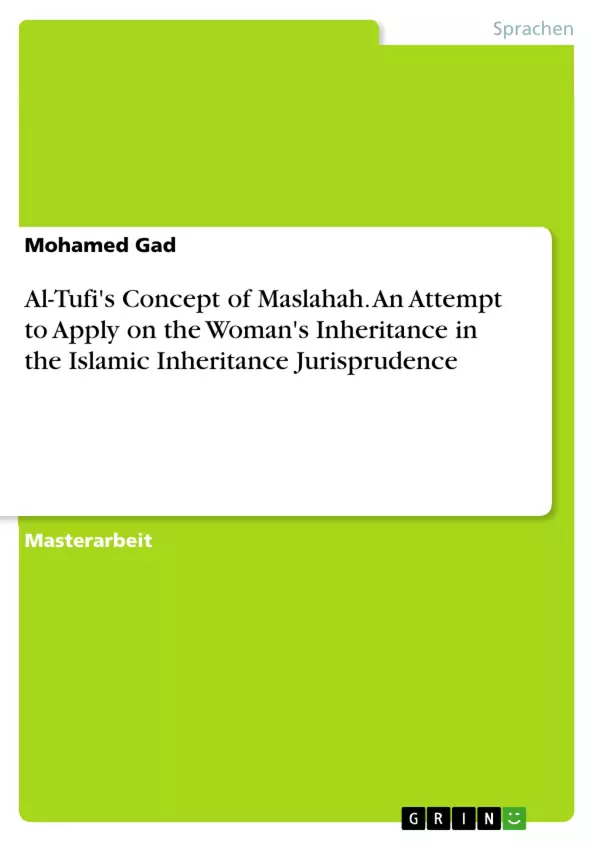This study aims to find an access point from which one can arrive at a principle that, based on the authoritative sources of Islam, provides a solution to the current problems of the entire Islamic community. The study deals scientifically with the concepts common good (al-Maslahah), the text (al-Nass) and the specification (at-Takhsis) of Al-Tufi to then examine whether this principle applies to current problems of Islamic law how the daughters' inheritance entitlement is to be applied.
The right of inheritance of women in Islam was revolutionary. Now that women are on the job market, take part in the maintenance of the family, and even become the breadwinner, it is totally unfair to give them only half of the inheritance of a male person. The practice of the Companions of the Prophet shows several cases where they have deviated from the authoritative parts of the inheritance in the Quran for achieving justice among the heirs, which questions whether they have any definite meaning.
Did the inheritance parts in the Quran only serve as guiding examples? The maslaha concept by Al-Tufi checks the legal norms for consequences in reality. If a norm was derived from a presumptive text and in practice somehow leads to harm to people, one may rather recognize the benefit of the people and avert the harm. Whether the inheritance of Quranic parts are presumptive and the maslaha concept comes into use is the subject of this thesis.
Inhaltsverzeichnis
- Introduction
- A. Status of research
- B. Problem statement
- C. Aim of the study
- D. Methodology and approach
- E. Formalities
- 1. A short biography of Al-Ṭūfi's Life and Work
- 1.1. Al-Ṭūfi's Life
- 1.2. Al-Ṭūfi's Work
- 2. Al-Ṭūfi's concept of maṣlaḥah
- 2.1. Roots of the ṭūfian concept in the tradition of the Principles of Islamic jurisprudence (Usul al-Fiqh)
- 2.2. Introduction to the concept of Al-Ṭūfi
- 2.3. Authenticity of the ḥadīth (lā ḍarara wa lā ḍirār)
- 2.4. Interpretation of the ḥadīth (lā ḍarara wa lā ḍirār)
- 2.5. Preferential consideration of the maṣlaḥah principle
- 2.5.1. Argumentation
- 2.5.2. Justification
- 2.5.3. Restriction to social dealings (mu āmalāt)
- 2.6. Refutation of the consensus as a source of law
- 2.7. Specification (takhṣīs)
- 2.7.1. Definition in the Uṣūl literature
- 2.7.2. Definition by Al-Ṭūfi
- 2.7.3. Scope of specification
- 2.7.4. Method of Specification
- 2.7.5. Criticism of the specification
- 2.8. The text (nass) in the sense of Al-Ṭūfi
- 2.8.1. Al-Ṭūfī's understanding of the text
- 2.8.2. The text in Al-Ṭūfi's other works
- 2.8.3. Which text can contradict the usefulness?
- 2.9. Collision of Benefits
- 2.10. Refutation of possible objections
- 2.11. Reception of Al-Ṭūfi by modern reformists
- 3. The practice of inheritance law and the ţūfîan concept
- 3.1. Introduction
- 3.2. The position of women in Islamic inheritance law
- 3.3. Attempts to question the practice of inheritance law
- 3.4. Approaches to the right of inheritance of women
- 3.4.1. The Approach of Shaḥrūr
- 3.4.2. The Approach of Alrahmany
- 3.4.3. Ijtihād in the division of inheritance
- 3.4.3.1. The case of 'Abdullāh ibn Mas'ūd
- 3.4.3.2. The case of ‘Umarīyyatān
- 3.4.3.3. The Obligatory Testament (al-Waṣiyya al-Wajiba)
- 3.4.3.4. Participation in wealth accumulation (Al-Kadd wa al-Si aiah) in Maliki law
- Das Konzept der Maṣlaḥah bei Al-Ṭūfi
- Die Rolle der Maṣlaḥah im islamischen Erbrecht
- Die Anwendung des ṭūfianischen Konzepts auf das Erbrecht der Frau
- Der Einfluss von Al-Ṭūfi auf moderne islamische Reformbewegungen
- Der Diskurs über die Rechtsposition von Frauen im Islam
Zielsetzung und Themenschwerpunkte
Diese Arbeit untersucht Al-Ṭūfi's Konzept der Maṣlaḥah im Kontext des islamischen Erbrechts. Sie analysiert die Hintergründe, die Entwicklung und die Rezeption des ṭūfianischen Konzepts und setzt es in Bezug zum heutigen Diskurs über die Rechtsposition von Frauen im Islam.
Zusammenfassung der Kapitel
Die Arbeit beginnt mit einer Einleitung, die den aktuellen Forschungsstand, die Problemstellung, die Zielsetzung und die Methodik des Projekts darlegt. Es folgt ein Abschnitt über das Leben und Werk von Al-Ṭūfi, um den Leser mit dem Autor und seiner Zeit vertraut zu machen. Der Hauptteil der Arbeit befasst sich mit Al-Ṭūfi's Konzept der Maṣlaḥah, indem er die Wurzeln dieses Konzepts in der Tradition der Prinzipien des islamischen Rechts beleuchtet und die wichtigsten Aspekte von Al-Ṭūfi's Interpretation erläutert.
Die folgenden Kapitel beschäftigen sich mit der Anwendung des ṭūfianischen Konzepts auf das islamische Erbrecht, insbesondere auf die Rechtsposition der Frau. Die Arbeit untersucht verschiedene Ansätze zur Auslegung des Erbrechts und analysiert die Argumente von reformorientierten islamischen Gelehrten, die sich für eine Neuinterpretation der islamischen Quellen einsetzen.
Schlüsselwörter
Die Arbeit widmet sich dem ṭūfianischen Konzept der Maṣlaḥah im Kontext des islamischen Erbrechts, untersucht dessen Relevanz für die Rechtsposition von Frauen im Islam und beleuchtet den Einfluss von Al-Ṭūfi auf moderne islamische Reformbewegungen. Weitere wichtige Begriffe sind: Uṣūl al-Fiqh, ḥadīth (lā ḍarara wa lā ḍirār), Ijtihād, islamisches Recht, Geschlechtergerechtigkeit.
- Citation du texte
- Mohamed Gad (Auteur), 2020, Al-Tufi's Concept of Maslahah. An Attempt to Apply on the Woman's Inheritance in the Islamic Inheritance Jurisprudence, Munich, GRIN Verlag, https://www.grin.com/document/1012235



